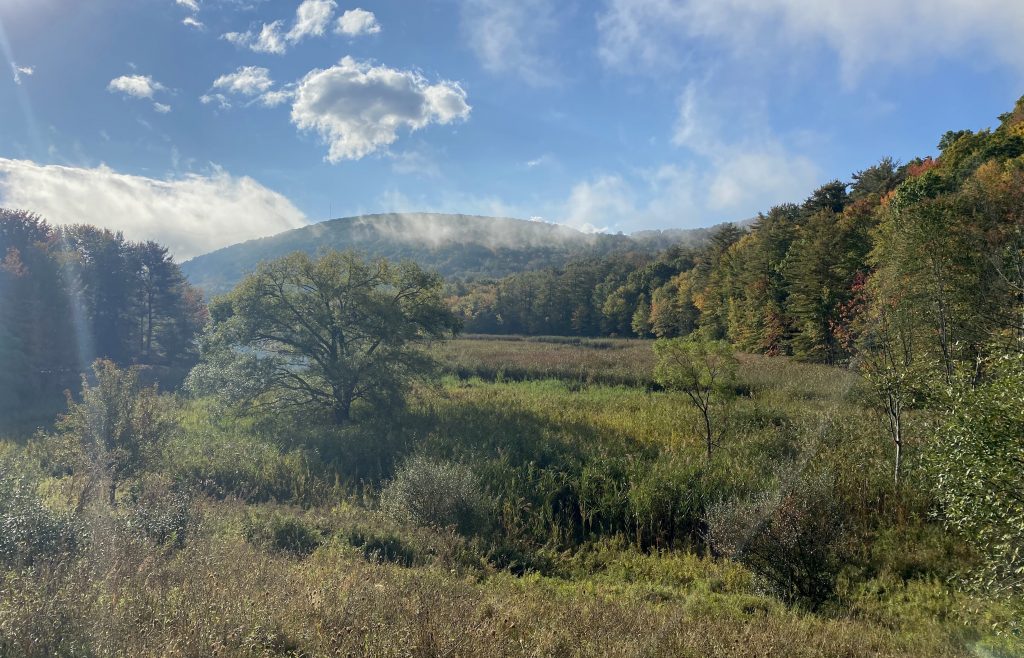
This year, College-in-the-Woods Dining Center will once again be converted into a secondhand store in order to raise funds for the Binghamton University Food Pantry and Nature Preserve.
The Pop-Up Thrift Shop, run by Jacob Kerr, a senior majoring in science communications, has for the past three years fundraised on behalf of the Nature Preserve, raising about $1,000 each time. In the past, its funds have been used to treat the hemlock trees of the Nature Preserve to protect them from a species of destructive invasive insect. This year, proceeds from the shop will be split equally between BU’s Food Pantry, which will use them to purchase produce and perishable items for sale over the summer, and the Nature Preserve. The Pop-Up Thrift Shop will take place this Friday, April 16, from 2 p.m. to 8 p.m. in the College-in-the-Woods Dining Center.
When Dylan Horvath, steward of natural areas of BU, was first approached about the event, he was inspired by Kerr’s motion to create it.
“I think it’s great that [Kerr] took the initiative to do fundraisers, and it shows that he really cares about the Nature Preserve,” Horvath wrote in an email. “Event planning really isn’t in my skill set, and I think more about providing nature management experience when interacting with students, so I don’t ever think of suggesting fundraisers.”
Linda Salomons, assistant director of parent and family programs and Food Pantry operations, saw the thrift shop as an ideal opportunity to raise awareness about and build the community around the BU Food Pantry.
“I actually saw a pop-up thrift shop promoted on [Instagram] in the fall of 2019 and sent a private message to ask if I could talk to the organizer,” Salomons wrote. “I thought working with a student or student organization on a thrift shop would be a perfect partnership for the Food Pantry.”
In the past, food donations for the BU Food Pantry have been raised via events like the You Give Goods online drive, which occurs every semester and generated nearly 1,500 pounds of food last semester. This semester’s event ends on Friday and donations can be made here [https://yougivegoods.com/bingfoodpantrys2021]. The Stop Hunger campaign, sponsored by BU Dining Services (BUDS), raised over $1,000 for the BU Food Pantry. The Nature Preserve also runs largely on donations, according to Horvath.
“The majority of actual management in the Nature Preserve relies on donation of funds, effort, time and sometimes materials,” Horvath wrote. “Land has been bought partially with donated money. Volunteers donate time and effort to help. In keeping with environmental thinking, we reuse donated materials as much as possible. For example, signs are made with donated or scavenged wood.”
Aside from monetary donations, Horvath said students can continue to support the Nature Preserve by volunteering, “following the rules, not littering and using good trail ethics.”
Madalyn Petherick, a graduate assistant at the BU Food Pantry and first-year master’s student pursuing a dual degree in public administration and student affairs administration, became involved with the food pantry as soon as she began the graduate program. During an interview with Salomons for acceptance into the master’s program, Petherick said she was struck by Salomons’ passion for the work of the food pantry. Petherick expressed the importance of novel events like the Pop-Up Thrift Shop.
“The food pantry is such a major need for students,” Petherick wrote. “[The Pop-Up Thrift Shop] is a fun and different way to raise awareness and funds to benefit pressing issues on campus, such as food insecurity and maintaining the Nature Preserve.”
Lin Fang, an intern with the food pantry and a junior majoring in biology, expressed her support for initiatives like Kerr’s, recognizing that both past drives and the thrift shop event provide an opportunity for students to rid themselves of unused items while supporting a good cause.
“[Food drives] not only help reduce waste from students’ unused groceries, it also allows for the relocation of food supplies to support students who are more in need,” Fang said. “Likewise, I think that the Pop-Up Thrift Shop will be an effective fundraiser if advertised properly because it allows students to clear out their wardrobe while generating profits that directly benefit the pantry.”
Megan Tapia, an intern for the food pantry and a senior majoring in human development, was also supportive of the effort and looks forward to future student-run benefits.
“I’m excited to see that we are going to be able to help [Kerr] with the Pop-Up Thrift Shop,” Tapia wrote. “I think it would be a fun idea to collaborate with other organizations on campus which also serve the dietary needs of students, for example the Food Co-op. I’m excited to see what other programs we can help out with in the future!”
Editor’s note: Jacob Kerr was Pipe Dream’s News editor from 2019-2020 and Pipe Dream’s Digital editor during the fall 2020 semester.


